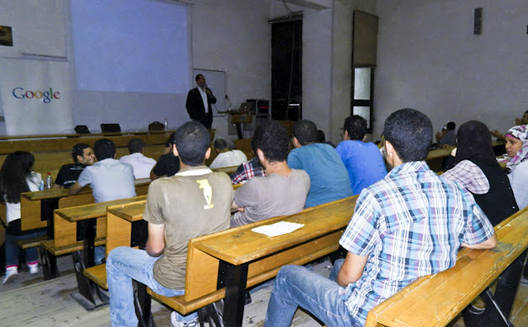Tech Entrepreneurs Prepare for a New Egypt

 Sometimes you attend an event
expecting one thing, but end up gaining insight into something
completely different. Or at least in something that seems
completely different. That was the case at the “Tech Talks” event
held at Ain Shams University last Wednesday.
Sometimes you attend an event
expecting one thing, but end up gaining insight into something
completely different. Or at least in something that seems
completely different. That was the case at the “Tech Talks” event
held at Ain Shams University last Wednesday.
The event was organised by Ayman El-Naggar and other Google Student Ambassadors, to bring entrepreneurial awareness to the Ain Shams students. Ayman et al. are firm believers that it’s extra-curricular activities such as this that give students the knowledge and exposure necessary to fill in the gaping holes in Egypt’s education system.
I had never been to Aim Shams before, and it had a certain anarchic feel that I enjoyed. It was graduation day for many, so groups of students outside the event were occasionally making lots of noise. A couple of times we heard loud bangs, and a couple of the guests got a little worried, especially as Abbasiyya square, the scene of recent violence, was only 100m away. But Ayman assured us that this was normal Ain Shams revelry and we all had a good laugh about it.
The events highlights came from three very different angles. Ahmed Abd Al-Hamid, IBM senior project manager, spoke mainly about natural talent being overrated. He believed that practice and discipline more than make up for any lack of talent, and mentioned that famous quote by golfer Gary Player, “the more I practice the luckier I get.” I personally feel this was an important point for the students to take in, as Egypt moves from corrupt crony capitalism to an entrepreneurial capitalism model. Entrepreneurship is all about good execution.
An example of good execution then came in the form of next speaker Gamal Sadek, co-founder of traffic information sharing service bey2ollak, who just won Google's Ebda2 competition. He spoke of bey2ollak's experience to date, and that although they launched pre-revolution, they were convinced that crowdsourcing would work in Egypt. The concept was new at the time, and they’d even been mocked by a business advisor pre-launch, but that only spurred them on. They were certain that Egyptians would be happy to help each other determine how to avoid traffic and take the best routes. The revolution then arrived a few months after, as if to prove the point. Now they have over 250,000 active users, all gained with zero marketing budget!
This “tribe building” ability was further discussed by the last speaker Ziad Ali, CEO and founder of ALZWAD, and founder of the Masrena (Our Egypt) movement. Ziad has founded over 20 companies, in all sorts of industries, so he has a wealth of experience on entrepreneurship. He spoke of the key traits of an entrepreneur: a certain level of paranoia; the willingness to dive into the unknown and take on board feedback; and a persistent personality.
The conversation then veered towards the political after Ziad "accidentaly" revealed who he was supporting in the presidential campaign. It was natural that after his speech ended, the students chose to question Ziad solely about his political choice. Egypt's first free presidential elections are pivotal to the future economic direction and lives of all of us here, not least these students. We might like to think entrepreneurs can rise above any challenge regardless of who's elected, but it will help if elected leaders work hard to support private sector growth.
A presidential candidate obviously has to have many entrepreneurial traits, so perhaps we shouldn't be surprised that entrepreneurs heading into the elections today will likely choose the candidates that best match their interests. After all, birds of a feather flock together.

